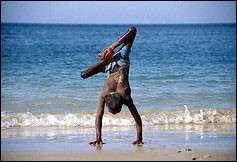Health and the sustainable development agenda

On the eve of the UN summit on Sustainable Development goals, Alarcos Cieza of the WHO reminds us that disability is part of the human experience contributing to human diversity.
On September 25-27 the United Nations Member States will meet in New York to agree on an ambitious post-2015 Development Agenda as the next phase of the Millennium Development Goals. For health professionals, the natural focus will be on Sustainable Development Goal 3: Ensure healthy lives and promote well-being for all at all ages. As the United Nations specialized agency for health, The World Health Organization (WHO) stands committed to the targets of SDG, which focus on reducing premature mortality from diseases and injuries, and to progressively achieve universal health coverage with high quality interventions that people need.
One of WHO's messages in New York will be about the need for the health community, and all other stakeholders, to rethink disability in the context of the SDGs. "No one must be left behind" is the commitment being made, with the universality of this message paramount.
Disability is often thought of as a serious misfortune that befalls a minority of people, fundamentally limiting their well-being and requiring substantial societal investment in health and social services.
As the world gears up to implement the ambitious Post-2015 Development Agenda and achieve the SDGs, it is important to reorient this understanding. Disability is not something that happens to 'them'; disability is about all of us. Disability is part of the human experience that contributes to human diversity. All of us are susceptible to chronic conditions, to injuries and illnesses, and most of us will face the normal processes of ageing. Whatever the cause, decrements on functioning will lead to the experience of disability, especially in the presence of a hindering environment including discrimination. Some forms of disability are more severe than others, and a political commitment to equality and human rights demands that we do what needs to be done to ensure that everyone experiencing disability, and especially those with severe disability who are the most vulnerable, can achieve full social inclusion.
Disability needs to be mainstreamed in the Post-2015 Development Agenda, not simply as a trait experienced by a minority, but as a basic and universal feature of human life. In this way we can truly ensure that no one is indeed left behind.
On September 24th, in the context of this United Nations Summit on the Sustainable Development Agenda, WHO will be part of a side event hosted by Ecuador, The Philippines and Spain, to raise awareness of the importance of leaving no one with disability behind.
This story is republished courtesy of PLOS Blogs: blogs.plos.org.
















